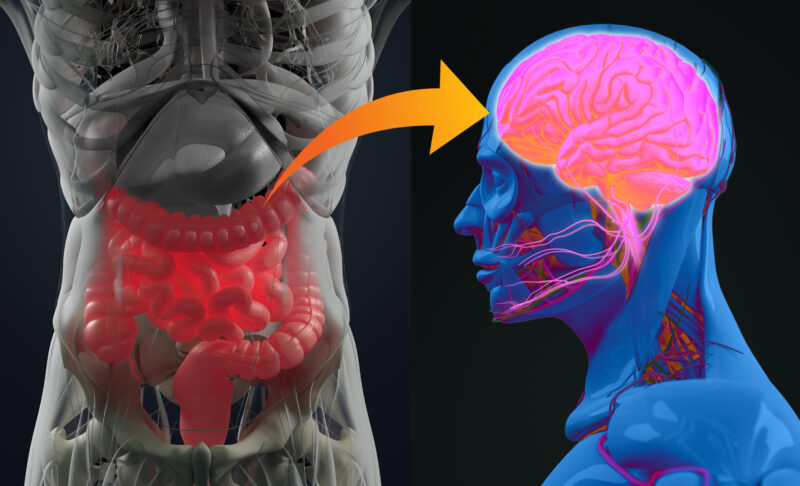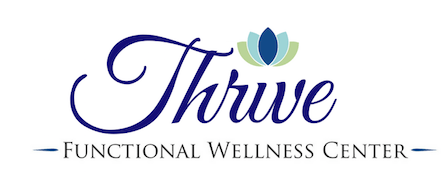
14 Aug The Gut-Brain Connection
Thinking things through and making decisions is part of every day life. We do it all day, every day but have you ever stopped to consider how many times you “go with your gut” on those decisions? This isn’t a trick question, that intuitive feeling or “butterflies in the stomach” feeling is the result of a real reaction between your brain and your gut.
Our brains are composed of approximately 100 billion neurons that tell our body what to do. Like, using a credit card, taking the stairs or participating in a healthy debate. However, if you thought the brain did all the heavy lifting, you’re wrong. Hidden within our digestive system is a second “brain” belonging to our gut called the ENS or Enteric Nervous System.
The ENS is made up of about 500 million neurons, and consists of approximately 100 million nerve cells in and around the GI tract. The main role of the ENS is controlling digestion “from swallowing to the release of enzymes that break down food to the control of blood flow that helps with nutrient absorption to elimination,” explains Jay Pasricha, M.D., director of the Johns Hopkins Center for Neurogastroenterology. [1]
But the ENS is also “intimately interconnected with millions of immune cells. These cells survey the digestive system and convey information, such as whether the stomach is bloated or whether there is infection in the GI tract or insufficient blood flow, back to the brain. Thus, the brain and GI system communicate with one another in both directions”. [2]
The communication system between your gut and brain is called the gut-brain axis. What exactly is the connection between brain and gut? The brain sends signals to the digestive, or gastrointestinal (GI), tract via the sympathetic (“fight or flight”) nervous system and the parasympathetic (“rest and digest”) nervous system. The balance of signals from these two inputs can affect the speed at which food moves through the digestive system, absorption of nutrients, secretion of digestive juices, and level of inflammation in the digestive system. [3]
Before we go any further, let’s just give our body a round of applause. Now that you know about the gut-brain axis and you’ll want to do all you can to support it, here are some beneficial foods to add to your diet:[4]

- Omega-3 fats: These fats are found in oily fish can increase good bacteria in the gut.
- Fermented foods: Yogurt, kefir, sauerkraut and some cheeses contain healthy microbes Fermented foods have been shown to alter brain activity.[5]
- High-fiber foods: Nuts, seeds, fruits and vegetables all contain prebiotic fibers that can reduce stress hormone in humans
- Polyphenol-rich foods: Cocoa, green tea and olive oil contain polyphenols, which are plant chemicals that are digested by your gut bacteria. Polyphenols increase healthy gut bacteria.
- Tryptophan-rich foods: Tryptophan is an amino acid found in turkey, eggs and cheese and is converted into the serotonin.
If you’re feeling a little off or experiencing symptoms of a not so ideal body situation, explore the root of the cause. You may be suffering from inflammation, or bacteria overgrowth, or have a sensitivity to medications for example. A certified functional medical practitioner can help you figure out your root causes, and find holistic solutions.
To register for one of our free seminars, visit our events calendar at https://thrivefunctionalwellness.com/events
Important Information: Dr. Rappe, D.C. is a certified functional medicine practitioner and is not a medical doctor. The information presented and/or supplements prescribed is not intended to take the place of your primary care physician’s advice and is not intended to diagnose, treat, cure or prevent any disease. Discuss our information with your own primary care physician to determine what is right for you. All information obtained in our office, from our website, social media pages, private member groups, health coaching services or other communications is intended for your general knowledge only and is not a substitute for medical advice from your primary care physician or treatment for specific medical conditions.
[1] https://www.hopkinsmedicine.org/health/wellness-and-prevention/the-brain-gut-connection[2,3] https://www.health.harvard.edu/blog/brain-gut-connection-explains-why-integrative-treatments-can-help-relieve-digestive-ailments-2019041116411
[4] https://www.healthline.com/nutrition/gut-brain-connection#section3
[5] https://www.ncbi.nlm.nih.gov/pmc/articles/PMC3839572/





Sorry, the comment form is closed at this time.